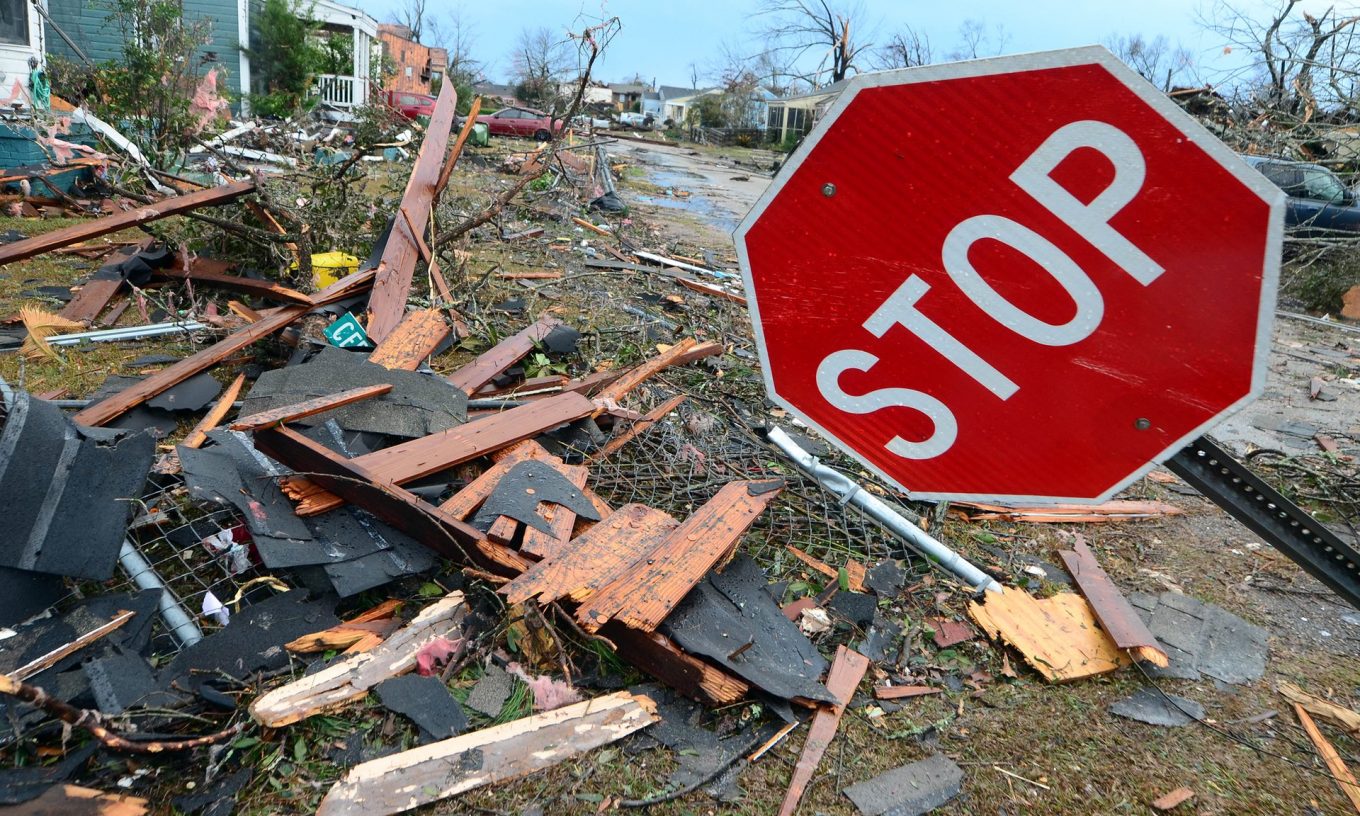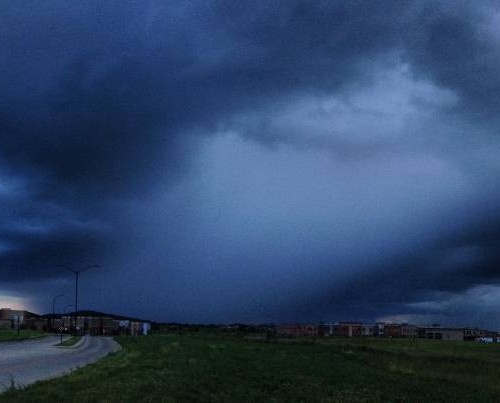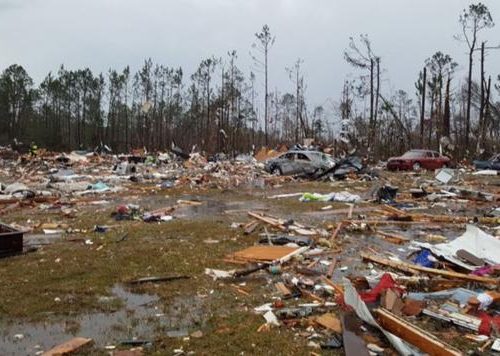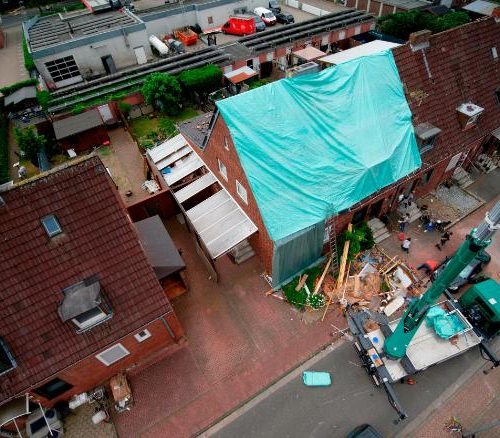Deadly weather in the south-eastern US has left at least 18 people dead and injured dozens more as residents along the Georgia-Florida line braced for more intense, fast-moving storms including unusually strong “long track” tornadoes.
At the White House, President Donald Trump pledged federal assistance for Georgia, Florida and Alabama.
Trump said during a swearing-in ceremony that he had spoken to Georgia governor Nathan Deal and planned to speak with Florida governor Rick Scott.
“The tornadoes were vicious and powerful and strong and they suffered greatly,” he said on Sunday. “So we’ll be helping out.”
On Sunday, a tornado blew through a mobile home park in rural Cook County in southern Georgia, sheering off siding, upending homes and killing seven people, officials said.
Coroner Tim Purvis said an apparent tornado “leveled” the park before dawn and that emergency responders searched for survivors for hours. Purvis said the park had about 40 mobile homes and roughly half were destroyed.
Photographs from Cook County posted by WSB-TV showed a large area strewn with twisted metal and broken wooden beams, with some mobile homes damaged but still standing.
Jalen Bennett, who lives about a mile from the park, said he was sleeping when a severe weather alarm sounded on his cellphone at about 4am.
“I woke up and I looked outside – it was just a lot of thundering and lightning, and it was real dark,” Bennett said. “I had to move downstairs to find shelter.”
Bennett, 19, said his home wasn’t damaged. He and other family members were staying put inside as more stormy weather pushed into the county.
Several homes appeared to be destroyed along on a road within about two miles of the mobile home park, with cinderblocks scattered on the ground and pine trees uprooted and snapped in half. The tops of utility poles lay alongside the road.
The South Georgia Motorsports Park in Cecil was heavy damaged: a grandstand was ripped apart. Barrels, signs, insulation and garbage were strewn over the speedway and parking lot.
Deal declared a state of emergency in seven southern counties, freeing up state resources to assist with recovery efforts. “Our thoughts and prayers are with Georgians suffering from the storm’s impact,” he said in a statement.
Four people were killed in adjoining counties on Sunday and another three were confirmed on Sunday evening in Dougherty county where Albany is located, said Catherine Howden, spokeswoman for the Georgia Emergency Management. A further four were killed in Mississippi by a tornado on Saturday making a total of 18 fatalities.
The National Weather Service said on Sunday that southern Georgia, northern Florida and the corner of south-eastern Alabama could face forceful tornadoes, damaging winds and large hail. Long track tornadoes, which plow on for miles, were also a real risk.
The weather service’s Storm Prediction Center warned on its website of a “dangerous outbreak of tornadoes” on Sunday afternoon and pressed for residents to prepare.
There are 4.8 million people under the high risk area; the total in the area of bad weather in the south east, who fall under the slight risk category or worse, is about 38 million people.
Two of Sunday’s deaths occurred when a mobile home was struck by an apparent tornado in Brooks County, which moved the home roughly 100 yards.
“A tornado hit a mobile home, picked it up and put it in the middle of Highway 122,” Brooks County coroner Michael Miller said. “I don’t know if it rolled or was lifted, but it blocked the entire highway.”
He said the storm struck at about 4am on Sunday and both people inside the home were pronounced dead at the scene.
Catherine Howden of the Georgia Emergency Management Agency said earlier that the deaths occurred in Cook, Brooks and Berrien counties in southern Georgia near the Georgia-Florida line. She said another 23 people were injured.
The sheriff’s office and coroner in Berrien County could not be reached for comment. Calls to their phones were met with busy signals for several hours.
While the central part of the US has a fairly defined tornado season – the spring – the risk of tornadoes “never really goes to zero” for most of the year in the south east, said Patrick Marsh, warning coordination meteorologist at the Storm Prediction Center in Norman, Oklahoma.
The last time that the prediction center issued a high-risk weather outlook – where forecasters are very confident of a tornado outbreak – was in 2014. Sunday marked only the third time since 2000 that any part of Florida had been at a high-risk for severe weather, Marsh said.
“This is a pretty rare event in this location,” Marsh said Sunday. “Any time the SPC issues a high-risk, for me, it’s sobering. We’re coming to work and there’s a strong likelihood that people’s lives will forever be changed. It’s very sobering.”
Russell Schneider, the director of the Storm Prediction Center, said although many long-time Gulf Coast residents understand that severe weather and tornadoes could strike any time of year, some new to the area might not immediately associate January with a tornado outbreak.
“We live in a very mobile society, we’re moving around the country all the time, I think people in the Gulf Coast unfortunately understand these tragedies [are possible],” Schneider said.
Bill Bunting, the chief of forecast operations at the center, said meteorologists expect severe storms to again fire up in the south east and when they develop, the cells will move rapidly.
“There will be many severe storms covering a large area, and they will be moving so quick that you really need to heed the warnings, or it could be too late at that point,” Bunting said. “There will be a risk well after dark.”
January tornado outbreaks are rare but not unprecedented, particularly in the South. Data from the Storm Prediction Center shows that, over the past decade, the nation has seen an average 38 tornadoes in January, ranging from a high of 84 in 2008 to just four in 2014.
If the storm fatalities reported so far this year – four each in Alabama and Mississippi and the 11 in Georgia – are all attributed to twisters, this January’s death toll would be worse than 1999. That year, 18 people died in series of storms in Texas, Arkansas and Tennessee.
by Associated Press in Atlanta
Sunday 22 January 2017 22.12 EST





